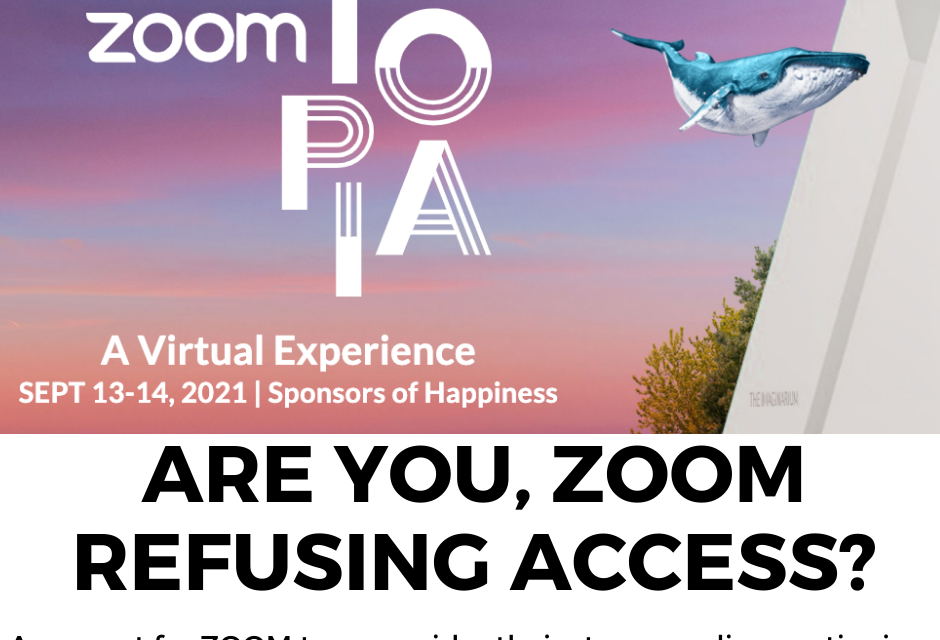Attending events on Zoom has become an everyday routine in many peoples’ lives especially with COVID-19, the technology has been around since 2011. Yet getting or coordinating for an interpreter to be present for those kinds of events is still tricky. Before the pandemic, cheese-making classes, knitting clubs, and other fun activities were available in person, but for the Deaf community, they were rarely accessible. Fewer were available in sign language directly from the host/hostess or having any real basic form of communication.
Convo has marketed the ability to connect with Zoom as a solution, this is not a catch-all solution and has worn down many Video Relay interpreters (To be clear, all providers can connect with Zoom through the call-in number). An example of a virtual event that is being made available to those interested in attending but is not 100% accessible for the community at large is Zoomtopia.
Zoom is currently offering “Zoomtopia,” and their announcement on the website says:
“Register today! Zoomtopia 2021, the annual celebration of our customers, takes place virtually September 13-14, and we’d love to “see you” there! This year’s theme – The Imaginarium – highlights all the ways you’ve used Zoom to embrace change, enable hybrid workforces, and continue to grow your business in the face of immense challenges. We’ll also take a moment at Zoomtopia 2021 to celebrate Zoom’s 10th anniversary! Tune in for additional happy surprises as we reflect on a decade of innovation and delivering happiness and how we’ll use what we’ve learned to create the future of communications.”
On Twitter, Robin Horwitz saw the announcement for “Zoomtopia” and inquired whether Zoom intended to provide an interpreter for the event in question.
In their response, Zoom told Horwitz no and instead wrote to Horwitz saying “Hi there – attendees will be able to turn on closed captioning within their sessions, but we will not have ASL interpreters for this event. Please let us know if you have any additional questions or feedback!” (Zoom)
Zoom has 4,422 employees; therefore, they must provide reasonable accommodations for their employees and consumers to be in compliance with federal ADA laws. They wrongfully assume that their automatic captioning covers all requirements that are expected of their company to provide under reasonable accommodations. Would many think that Zoom is accurate in its assumption?
Ironically, Telecommunications for Deaf and Hard of Hearing Inc. [TDI] awarded Zoom with an accessibility award at their 2021 conference intending to highlight their work in the field. On TDI’s website, it says, “ The Robert H. Weitbrecht Award for Telecommunications Access was awarded to Zoom Video Communications. This award is given to individuals, organizations, or companies who have made outstanding contributions by any means to improve accessibility in telecommunications and media. In recognition of Zoom’s commitment to accessibility on its video conferencing platform. By providing leadership in accessible design, Zoom’s interface enables deaf and hard of hearing participants across America to fully participate in virtual school, work, civic, and social gatherings online.” (TDI For Access)
Deaf Vee Journal reached out to Zoom to connect with their ADA Coordinator and ask more questions to see what their view is on accessibility levels and if they think their conduct is acceptable. After further review, it is possible that Zoom may also be violating certain subsections within the ADA law itself. Inaccurate captioning which is commonplace still even with the most advanced algorithms can completely change the meaning of the content and how the consumer processes the information. For deaf and hard-of-hearing viewers, this is an unfair violation and a warping of the purpose of certain requirements set forth that all companies are required to comply with according to the ADA. A white paper by 3PlayMedia highlighted that automated captions might not protect a company from being liable to be sued for violating certain sections and requirements in the ADA law. “To avoid litigation, it’s important to make sure that your content is captioned. But that’s not all. Inaccurate and intelligible captions are not accessible, and because of that, they are not going to protect you from a lawsuit.” (3PlayMedia)
It would be in the best interest for zoom to have a meeting with representatives within the community at large or request a consultation on methods they could incorporate into their business model. There are many organizations that walk the same thin line as Zoom, it becomes a standard in the industry when corners are cut that they can continue to do so down the line. For this reason, it becomes even more important than the community remains vigilant and pays attention to any other organizations that may try to use the same excuses; if we don’t ask zoom to rise to the expected standard how can we preserve our access online?
Updated August 27, 2021 at 8:30 PM MST: The TDI CEO Kaika connected with Deaf Vee Journal and let us know that they are aware of the concerns about accessibility at Zoomtopia. “We’ve already reached out to them and encouraged them to reconsider their stance. We’re still waiting to hear their final counter, and as I understand there’s been a lot of other community members making a similar request, so hopefully we’ll hear back with some good news soon.” (Kaika)
Shortly after this email was received, we also were informed that Zoom had contacted Kaika and shared an important update:
“Just checked in with Zoomtopia team and we will be providing ASL interpreters for our Vision and Product keynotes. We are still looking into options for other sessions.” (ZOOM)






